
Explore how to establish an inclusive and equitable esports program for diverse students.
- Subject:
- Educational Technology
- Professional Learning
- Material Type:
- Module
- Provider:
- Microsoft Education
- Date Added:
- 08/03/2023

Explore how to establish an inclusive and equitable esports program for diverse students.

Establishing a whole-school culture of data use helps all stakeholders make thoughtful, consistent, and appropriate data-based decisions. Schools can develop a data plan and team to guide the use of data and to support a culture of data use. The data team can develop a shared vocabulary for critical concepts of data use and learning.

The original thirteen states that formed the United States included individuals from a variety of religious traditions. To ensure that the national government respected freedom of belief, freedom of conscience, and freedom of religious practice, the First Amendment prohibited the federal government from either establishing a national church or interfering with existing state religions. Since then the Supreme Court has created various "tests" to determine if government practices violate the Establishment Clause of the First Amendment. This lesson explores the history and principles behind this clause.

This Flash game for one or two players gives students practice in estimating the size of angles. A circle and a radius pointing in a random direction are given. The student activates a second sweeping radius, which can move in either direction, and tries to stop it at the specified measure. Three difficulty levels control the range of angle measures. Points are awarded based on closeness of the estimate. The Teachers' Notes page includes suggestions for implementation, discussion questions, ideas for extension and support.

Franklin works with Laverne to create a budget for a job painting a room, in this video segment from TV 411.

Harry estimates how long it will take him to get to the front of a long ticket line in this Cyberchase video segment.
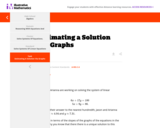
The purpose of this task is to give students an opportunity use quantitative and graphical reasoning to detect an error in a solution. The equations have been chosen so that finding the exact solution requires significant calculation so that it is easy to make an error.
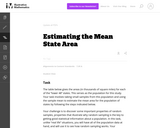
The task is designed to show that random samples produce distributions of sample means that center at the population mean, and that the variation in the sample means will decrease noticeably as the sample size increases. Random sampling (like mixing names in a hat and drawing out a sample) is not a new idea to most students, although the terminology is likely to be new.

Students use a double clothesline to work with algebraic expressions and determining which are equivalent. A different take on evaluating expressions. Students need to use their critical thinking skills.

This is a three act task where students are asked to determine a relationship between the rate of a ferrari and the length of a rope.
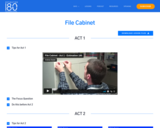
Use this three act task to get students thinking about surface area. Extend the task to create a method/formula for surface area of a prism.

Use this clothesline game to help students with operations with integers.

Use this three act task to have students make predictions and determine which area is the greatest.
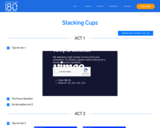
Use this three act task to have students create different representations to determine how many cups will have the stacks be the same height. Use to come up with a plan to solve systems of equations.
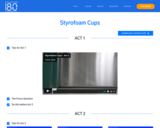
Use this three act task as students are learning about constant rate of change, slope and linear functions.

This task has students determine how much some yogurt costs. There are multiple ways to approach this problem including unit rates, proportions and scale factors. Allow your students to think creatively and critically as they work through this task.

Explore size estimation in one, two and three dimensions! Multiple levels of difficulty allow for progressive skill improvement.

Familias y cuidadores: ustedes tienen un papel importante en el aprendizaje del lenguaje de sus hijos. Los niños pueden aprender palabras nuevas todos los días escuchando, hablando, escribiendo y dibujando. El propósito de esta actividad es ayudar a los niños a aprender y practicar un conjunto pequeño de palabras nuevas durante un tiempo, adaptándolas a su vocabulario.

Familias y cuidadores: ustedes tienen un papel importante en el aprendizaje del lenguaje de sus niños. Los niños pueden aprender palabras nuevas todos los días y desarrollar su vocabulario utilizando lenguaje descriptivo. Al jugar este juego, usted y su niño o niña utilizarán el lenguaje para describir y adivinar objetos del hogar escondidos.

Familias y cuidadores: ustedes tienen un papel importante en el aprendizaje del lenguaje de sus niños. Los niños pueden fortalecer su lenguaje todos los días, haciendo y respondiendo preguntas sobre una experiencia. En esta actividad, usted le pedirá a su niño o niña que hable sobre una experiencia que haya tenido.